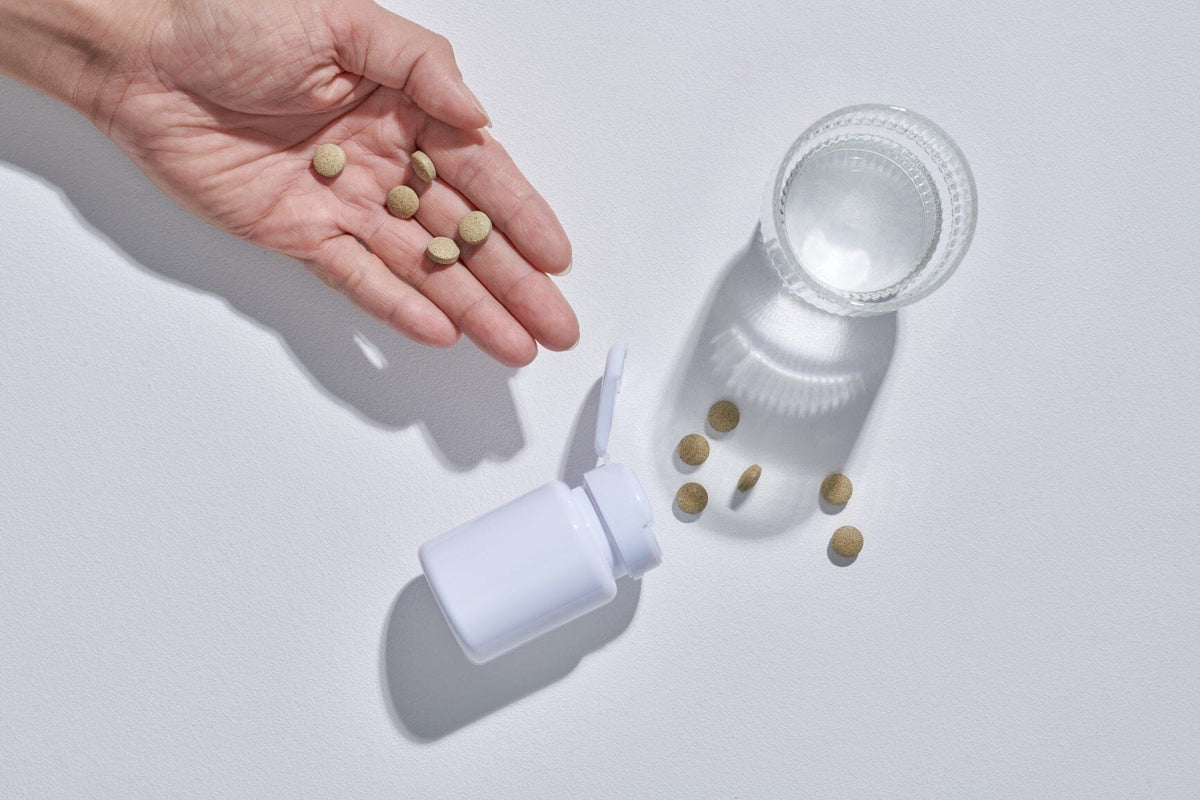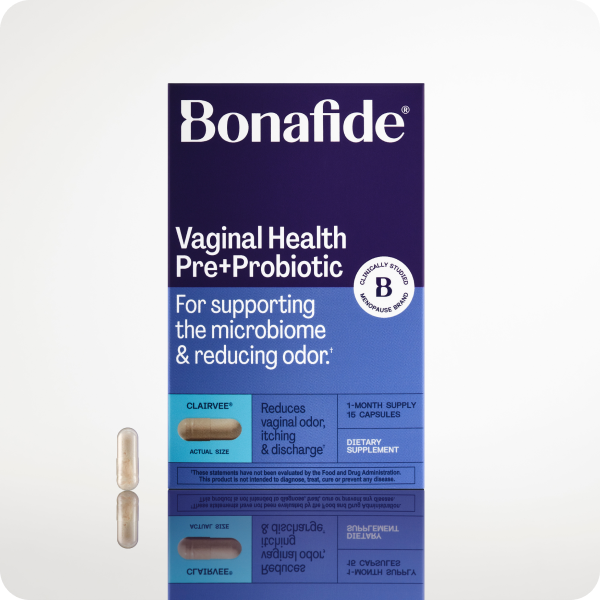Diet and nutrition play a significant role in supporting our health and wellness, but did you know that they can also affect a certain balance in our bodies? We’re talking about pH balance — more specifically, vaginal pH balance.
Understanding vaginal pH, including understanding which vitamins help with vaginal pH balance, can help you better support vaginal health as you approach menopause and beyond.
What is Vaginal pH?
The vagina has a unique pH that must be kept in balance in order to prevent certain symptoms such as vaginal itching, discharge, odor, irritation, or infection.
The vagina’s pH is acidic, ranging from about 3.8-4.5. The acidity of the vagina helps fend off certain harmful bacteria and other organisms that can cause irritation, infection and illness.1 As estrogen levels decrease during menopause, the vaginal pH balance becomes more alkaline, rising to about 6.5-7.0. This change from acidic to alkaline makes menopausal women even more prone to conditions like yeast infections and bacterial vaginosis (BV).2
In addition to lower estrogen levels during menopause, some of the things that can disrupt the delicate vaginal pH balance include:
- Douching
- Using products containing fragrance or other chemical irritants in the vaginal area
- Wearing clothing that is tight and non-breathable
Learn more about vaginal pH during menopause and beyond from Chief Medical Officer, Dr. Alyssa Dweck, below:
Can Vaginal pH Cause Vaginal Dryness?
Anything that throws vaginal pH off balance can lead to symptoms such as burning, itching and dryness. Since vaginal dryness can already occur before, during and after menopause, simply because of decreased estrogen levels, a disruption in vaginal pH may make dryness, and its associated symptoms, even more problematic.3
If you’re interested in additional information on vaginal dryness, we talk more specifically about the best remedies to consider in a separate article and encourage you to check it out if that information would be helpful for you!
What Vitamins Help with Vaginal Health?
If you’re looking for information about what vitamins can help with vaginal pH balance and overall vaginal health, keep reading. When taken as dietary supplements, there are beneficial vitamins and minerals for women that may help keep the vaginal pH balanced before, during and after menopause. These include:
Vitamin C for Women’s pH Balance Support
Research suggests that vitamin C tablets or suppositories inserted in the vagina can help lower vaginal pH.4 One randomized, double-blind, placebo-controlled clinical trial found that vitamin C vaginal tablets could help prevent bacterial vaginosis in women who are prone to it.5 Again, before considering vitamin C for its pH balance benefits, be sure to check in with your healthcare provider first, just as a precaution.
Apple Cider Vinegar
A dietary option for supporting vaginal health is apple cider vinegar (ACV). While more studies are needed, ACV has been shown to have antifungal and antibacterial properties when taken orally.6 If you’re considering trying ACV, you can choose to drink a diluted version of it or take it in the form of a dietary supplement. It’s important to note that ACV is not to be used vaginally as it has the potential to further disrupt vaginal pH and can be caustic to delicate vaginal tissues.7
Probiotics to Help with pH Balance
Probiotics geared toward supporting vaginal health and female pH balance, contain “good” lactobacilli bacteria strains that work to produce hydrogen peroxide and lactic acid in the vaginal microbiome. Hydrogen peroxide and lactic acid help to maintain a low or acidic vaginal pH .8
D-mannose
D-mannose, may be a good option for menopausal women and supporting pH balance, specifically. It’s a type of sugar that’s related to glucose and is found in certain fruits and berries.9 It’s been shown in several clinical trials to help ease certain vaginal health issues10. Like the beneficial compounds found in cranberries, taking d-mannose may help due to its ability to support our bladder wall’s integrity, keeping bad bacteria from sticking to the urinary tract, which may otherwise lead to infection. D-mannose is naturally found in fruits, like blueberries and peaches, but supplements can provide it in more concentrated amounts.11
Garlic Pills
Garlic possesses potent antibacterial and antifungal properties, thanks to a phytoactive compound called allicin.12 One study found garlic tablets, when taken orally, can be helpful for to treating the symptoms of vaginal infections — with fewer side effects, however they’re not to be compared to the efficacy of antibiotics.13 If you think you may have an infection or yeast infection, it’s important to not self-diagnose. Always check in with your healthcare provider before treating an infection to ensure you’re getting the appropriate treatment for the issue you’re seeking to remediate.
Cranberry Supplements
The acidic nature of cranberries means they may help to support healthy vaginal pH levels. They also contain compounds called proanthocyanidins which may help to flush UTI-causing bacteria from the body.14 Cranberry comes in the form of fruits, juices and vitamins, which may help with maintaining pH balance.
Choosing the Right Vitamins for Vaginal Health
When considering vitamins to help with vaginal pH balance, be sure to look for products from a reputable company along with supplements that contain meaningful amounts of the active ingredients. Also check with your healthcare provider or pharmacist first, about any potential interactions with medications you’re taking before adding anything new into your supplement routine.
Resources
- https://www.webmd.com/women/what-is-vaginal-ph-balance
- https://www.ncbi.nlm.nih.gov/pmc/articles/PMC2398721/#:~:text=During%20premenopausal%20years%20vaginal%20luminal,to%20about%205.5%20(1).
- https://www.insider.com/guides/health/conditions-symptoms/vaginal-dryness#:~:text=An%20upset%20in%20the%20vagina's,dryness%2C%20itching%2C%20or%20burning.
- https://pubmed.ncbi.nlm.nih.gov/16723311/
- https://www.ncbi.nlm.nih.gov/pmc/articles/PMC3712888/
- https://www.ncbi.nlm.nih.gov/pmc/articles/PMC5788933/
- https://www.verywellhealth.com/natural-remedies-to-restore-ph-balance-5208998
- https://health.clevelandclinic.org/probiotics-for-vaginal-health/amp/
- https://nutritionj.biomedcentral.com/articles/10.1186/s12937-022-00769-x
- https://pubmed.ncbi.nlm.nih.gov/32972899/
- https://www.mindbodygreen.com/articles/best-vitamins-for-vaginal-health
- https://www.healthline.com/health/natural-remedies-to-restore-ph-balance#natural-remedies
- https://www.ncbi.nlm.nih.gov/pmc/articles/PMC4166107/
- https://pubmed.ncbi.nlm.nih.gov/16055161/









